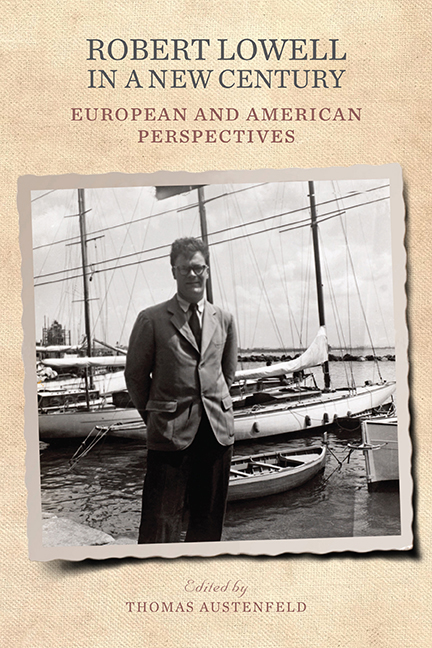Book contents
- Frontmatter
- Dedication
- Contents
- Acknowledgments
- Introduction
- 1 Revisiting Robert Lowell's Mental Hospital Poems
- 2 Sensual Drift and Ethnic Longing in Robert Lowell
- 3 Reworking the Same Water: Robert Lowell Transported
- 4 “Sweet salt embalms me”: A Hippocratic Approach to the Role of the Sea in the Poetry of Robert Lowell
- 5 More Delicate Than the Historian's Are the Map-Maker's Colors: Correspondences between Lowell's Poetics of History and Bishop's Poetics of Space
- 6 Robert Lowell and Ezra Pound's Economics
- 7 Robert Lowell and Ezra Pound in Washington and Rapallo
- 8 “Why Holland?”: Robert Lowell in Amsterdam
- 9 Lowell and Ungaretti: Imitations and Beyond
- 10 Robert Lowell's Credo
- 11 “Marriage? That's another story”: Reconsidering the Marital Trope in Robert Lowell's Poetry
- 12 “Oh No”/“Yes Yes”: Lowell and the Making of Mistakes
- 13 Robert Lowell: The Power of Influence
- Notes on Contributors
- Index
12 - “Oh No”/“Yes Yes”: Lowell and the Making of Mistakes
Published online by Cambridge University Press: 26 June 2019
- Frontmatter
- Dedication
- Contents
- Acknowledgments
- Introduction
- 1 Revisiting Robert Lowell's Mental Hospital Poems
- 2 Sensual Drift and Ethnic Longing in Robert Lowell
- 3 Reworking the Same Water: Robert Lowell Transported
- 4 “Sweet salt embalms me”: A Hippocratic Approach to the Role of the Sea in the Poetry of Robert Lowell
- 5 More Delicate Than the Historian's Are the Map-Maker's Colors: Correspondences between Lowell's Poetics of History and Bishop's Poetics of Space
- 6 Robert Lowell and Ezra Pound's Economics
- 7 Robert Lowell and Ezra Pound in Washington and Rapallo
- 8 “Why Holland?”: Robert Lowell in Amsterdam
- 9 Lowell and Ungaretti: Imitations and Beyond
- 10 Robert Lowell's Credo
- 11 “Marriage? That's another story”: Reconsidering the Marital Trope in Robert Lowell's Poetry
- 12 “Oh No”/“Yes Yes”: Lowell and the Making of Mistakes
- 13 Robert Lowell: The Power of Influence
- Notes on Contributors
- Index
Summary
IN JUNE 1965, to protest the escalation of the Vietnam War and the sending of American troops to the Dominican Republic, Robert Lowell declined an invitation to Lyndon B. Johnson's White House Festival of the Arts in a public statement that was covered on the front page of the New York Times. In August it was reported that LBJ met with college students on the White House lawn and “invoked the poet Robert Lowell”:
“Robert Lowell, the poet, doesn't like everything around here,” he said. “But I like one of his lines where he wrote: ‘For the world which seems to lie out before us like a land of dreams.’ Well, in this great age—and it is a great age—the world does seem to lie before us like a land of dreams.”
Misquote by Johnson
The line that President Johnson attributed to Mr. Lowell actually appears in the last stanza of Matthew Arnold's “Dover Beach.” Reached by telephone at his vacation home in Maine and asked about the line, Mr. Lowell said, “that's Milton, the end of Paradise Lost.” Then he corrected himself and agreed it came from Arnold's poem.
“I don't know why the president said I wrote that,” the poet said. “Maybe he was trying to be funny. One shouldn't make that kind of error. But, then, I did too.”
Mr. Lowell recalled that he had used the Arnold line as an epigraph to introduce a poem in one of his volumes, The Mills of the Kavanaughs. He guessed that that was where the president saw the line.
In his biography of Lowell, Ian Hamilton commented on this episode dismissively, calling it a “comic postscript” to Lowell's act of protest, speculating that “Johnson's speech writer, in a hurry to supply an upbeat quote, had not adventured past the title page.” Lowell himself wrote of the incident in a letter to Stanley Kunitz on August 16, 1965: “Wasn't the Dover beach grotesque? Some one from the Times called me at eleven thirty after a party and asked me if the lines were mine. All I could think of were the words ‘world’ and ‘before’ and I said, ‘Oh no, they are by John Milton.’”
- Type
- Chapter
- Information
- Robert Lowell in a New CenturyEuropean and American Perspectives, pp. 156 - 169Publisher: Boydell & BrewerPrint publication year: 2019



